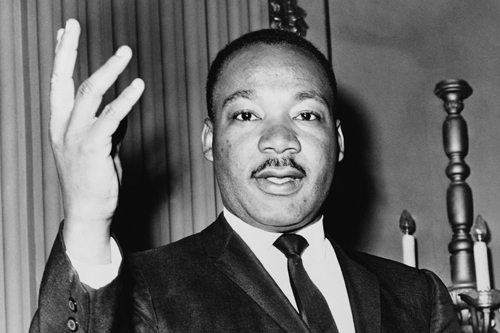 On January 15, 1929, in the bedroom his parents shared in his grandparents’ house on Auburn Avenue in Atlanta, Michael Luther King Jr. was born. No, Michael is not a typo.
On January 15, 1929, in the bedroom his parents shared in his grandparents’ house on Auburn Avenue in Atlanta, Michael Luther King Jr. was born. No, Michael is not a typo.
It wasn’t until 1934, upon his return from a globe-spanning journey that had taken him from Paris and Rome to Cairo, Jerusalem, and Berlin, where he was a delegate at a meeting of the World Baptist Alliance, that the Reverend Michael Luther King Sr. formally changed both his and his son’s names to Martin.
It’s fascinating to consider how King, who did so much to transform America, must have processed his own transformation—from Michael to Martin, from pastor to political figure, from political figure to prophet.“The change of name,” Taylor Branch wrote in his book Parting the Waters: America in the King Years 1954-63, “was one of the most important events in the younger King’s early life. For him it would be the mark of great expectations.” “Name changes,” Branch added, “have always been part of religious history, used to announce the existence of a ‘new person.’ Jacob became Israel, Saul of Tarsus became Paul, Simon became Peter.”
It’s fascinating to consider how King, who did so much to transform America, must have processed his own transformation—from Michael to Martin, from pastor to political figure, from political figure to prophet.
It must have been a daunting thing for him to believe that he was destined to walk the path of Martin Luther. The Protestant Reformation was about much more than religious doctrine; it is one of history’s bloodiest passages. No country in Europe would be untouched by it; between 25 and 40 percent of Germany’s population would die in the Thirty Years War that it sparked.
We need to remember that the gauntlet King threw down back then has yet to be picked up—that racism, poverty, inequality, and injustice are virtually no less with us in our own day than they were in his. Apostle of peace that he was, Martin Luther King knew that the civil rights movement he led had unleashed a volcano. “These are revolutionary times,” he declared in the “Beyond Vietnam” speech he delivered at Riverside Church in New York City in 1967. “Out of the wounds of a frail world, new systems of justice and equality are being born. The shirtless and barefoot people of the land are rising up as never before.” He paid a steep price in reputation for those words. 168 newspapers denounced him the next morning, including the New York Times and the Washington Post, which declared that he had “diminished his usefulness to his cause, his country, and his people.”
We need to remember that the gauntlet King threw down back then has yet to be picked up—that racism, poverty, inequality, and injustice are virtually no less with us in our own day than they were in his. But just as the archangel Michael in John Milton’s great biblical poem Paradise Lost took Adam to the top of the highest mountain in Eden, from which he could witness mankind’s future redemption, King also gave us a vision of hope.
I like to think of him on that podium at the Mason Temple in Memphis—part Moses, part Martin, part Michael, but most of all, an exhausted young man of flesh and blood, staring his own death in the face.“Like anybody,” he said on the last night of his life, “I would like to live a long life. Longevity has its place. But I’m not concerned about that now. I just want to do God’s will. And He’s allowed me to go up to the mountain. And I’ve looked over. And I’ve seen the promised land. I may not get there with you. But I want you to know tonight, that we, as a people, will get to the promised land!”
It is ironic that King, gadfly of a complacent and complicit establishment, has been transformed into a national icon, a marbled figure from the past. I like to think of him on that podium at the Mason Temple in Memphis—part Moses, part Martin, part Michael, but most of all, an exhausted young man of flesh and blood, staring his own death in the face.
“I’m happy tonight,” he concluded in the last speech he would ever deliver. “I’m not worried about anything. I’m not fearing any man. Mine eyes have seen the glory of the coming of the Lord!”
Just 39 years old, the father of four young children, he had long since surrendered his destiny to history.




1 Comment
Andrew C.
He lies information that I never knew about Dr. Martin Luther King Jr.
Thanks and will be sure to read more articles here.